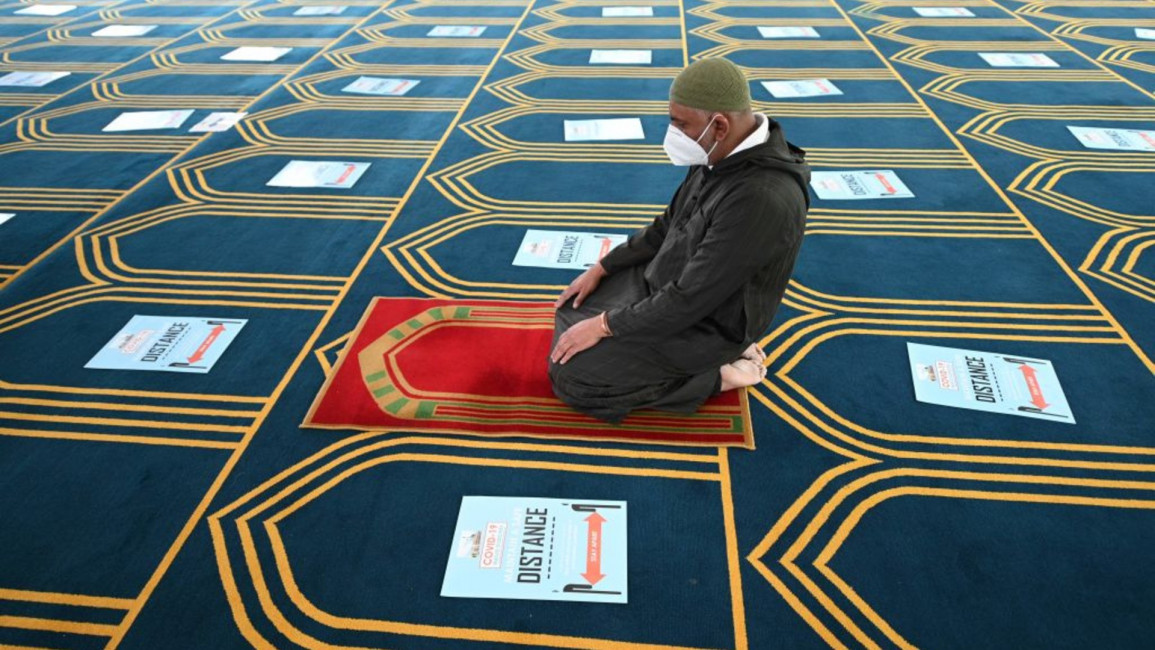
Friday's 'Covid Eid' takes another bittersweet turn for UK Muslims
UK Muslims were already expecting a bittersweet occasion due to the ongoing pandemic, but on Thursday night, Health Secretary Matt Hancock announced that members of separate households would be banned from meeting each other indoors in Manchester, parts of Lancashire and parts of West Yorkshire - almost all places with significant Muslim communities.
British Muslim communities have already been particularly impacted by the virus, both in its health effects, and in the social divisions inflamed by lockdown measures. In fact, Covid-19 is two to three times more likely to be fatal for black and minority ethnic groups, and government advisors have expressed particular concerns around Muslim communities since the very beginning of the pandemic.
Much of this can be explained quite simply through poverty and overcrowding, all leading to increased virus spread and poor health overall: 46 percent of the UK's Muslim population reside in 10 percent of the poorest local authorities in England.
Nevertheless, this has created a stigma around Muslim communities, worsened by the fact that areas in the UK at high risk of, or already under a second lockdown are almost all localities with significant Muslim communities. Leicester, the first place where a second lockdown was implemented, is 20 percent Muslim.
 |
Covid-19 is two to three times more likely to be fatal for black and minority ethnic groups |  |
In addition, we know that Muslims are disproportionately represented in the NHS, for which Brits have clapped weekly for nearly three months. On occasion, their work has been visibly celebrated in public spaces such as in Piccadilly Circus, but powerful exceptions like this sadly prove the rule that Muslim contributions are seldom celebrated.
And rather than support for Muslim communities at this particularly challenging time, some have actively used the crisis to spread misinformation and prejudice. Far-right figureheads such as Tommy Robinson and Katie Hopkins have shamelessly accused Muslims of flouting social distancing rules, and suggested they have enjoyed privilege in the timing of lockdowns, both claims which have been proven to be totally false.
Twitter Post
|
But this so-called 'Covid Islamophobia' is not limited to fringe figures. What is often viewed as the UK's newspaper of record, the Telegraph, published a sensationalist and racially charged article that alleged that half of the UK's imported Covid cases were from Pakistan, a claim disproven by both the statistics and the Pakistani government's own statement.
Many Muslim-majority countries felt the brunt of the pandemic later than Europe, and are only now dealing with rising infections in the face of limited medical infrastructures. This is something I have seen first hand as CEO of British Muslim-led humanitarian charity, Penny Appeal. We've coordinated life saving humanitarian interventions in Syria, Yemen and Gaza, including distribution of essential Covid-19 testing kits, quarantine infrastructure and hygiene kits.
Read more: A Ramadan like no other
Drawing inspiration from their faith, the Muslim response to this has largely been to express solidarity with those struggling, cementing their role as an integral element of British civil society. In the past few months, Muslims in Britain have donated millions of pounds for Covid-19 appeals, much of it inspired by their own experiences and wishing to express solidarity and support for those communities around the world particularly vulnerable to the virus.
Muslim life and worship is inherently communal - prayers should be done in congregation every Friday, if not more often. But Covid has robbed Muslims of their communal life, and religious rites such as the Haj pilgrimage. It is the ongoing disruption to this sense of community that is one of the most painful features of the pandemic for Muslims.
They have suffered disproportionately, and this has even been exploited to increase prejudice against them. But far from retreating, they have responded by being hugely proactive in the fight against the virus, filling the gaps where governments are falling short, and providing a safety net for the most vulnerable through their contributions.
A recent report, highlighted by the UK Minister of Civil Society profiles the work of almost 200 Muslim charities in response to Covid. Tracked by the Muslim Charities Forum, it details a range of activities, including my team's work in housing the homeless.
 |
Muslim charities like the one I lead have long been called the 'fourth emergency service' |  |
Muslim charities like the one I lead have long been called the 'fourth emergency service'. It has taken a pandemic to show us just how important that emergency service is, not only in saving lives but in bringing together an increasingly isolated and fragmented society.
The sacrifice Muslims commemorate at Eid is in even sharper focus this year. The pilgrimage season has a powerful message of unity and patience for us all. With British Muslims unable to partake in the Hajj this year, perhaps that unifying message can have a more domestic audience. We can only hope the country will listen.
Harris Iqbal is CEO of humanitarian charity Penny Appeal.
Opinions expressed in this article remain those of the author and do not necessarily represent those of The New Arab, its editorial board or staff.



